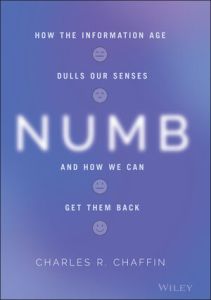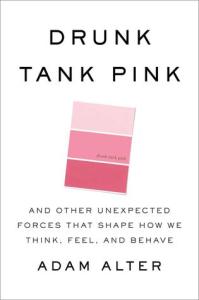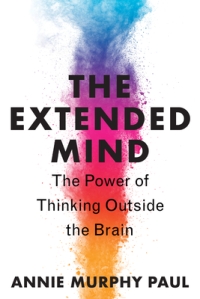Title: Numb: How the Information Age Dulls Our Senses and How We Can Get Them Back
Author: Charles R. Chaffin
Genre: Pop Psychology
Trigger Warnings: Moralizing about food, diet culture
Back Cover:
In Numb, distinguished author Dr. Charles R. Chaffin delivers a fun and evidence-based exploration of how you can devote more attention on what you believe is important while ignoring the distractions that increasingly permeate your life. Using research from cognitive, education, positive, and clinical psychology, the book identifies the sources of noise and distraction in this information age and how we can manage it in all aspects of our lives.
You’ll learn about:
- How experiences in technology, from social media to selfies to porn, impact our ability to engage and connect with others
- The news we consume and the impact of confirmation bias, filter bubbles, and tribalism
- How FOMO and choice overload impact our decision-making
- The power of our attention in all aspects of our daily lives
Perfect for anyone interested in the expanding impact of the information age on our collective psyche, Numb helps empower you to use technology and information not as a destination, but as a tool towards authenticity and empowerment.
Review:
This is not technically a book that promised practical actions and then didn’t tell me what to actually do. But the usefulness of the “practical actions” here is limited, and I think this does count as a book whose title lied to me, even if it didn’t technically lie about proposing a solution.
The subtitle of this book is “How the Information Age Dulls our Senses and How We Can Get Them Back.” That subtitle is the main reason I picked up this book. I didn’t feel like my senses were getting dull, but I wanted to read about how they were and how I could fix it. That is not what I actually got in this book.
Charles does not look that old in his author photo (and this book came out six months ago so I assume his picture is fairly up-to-date), but this whole book makes me think of an old man complaining, “You kids and your mobile telephones! Get off your Tweeter apps and talk to your friends face to face, why dontcha!” Now, this is not entirely fair, since I can tell Charles either uses the technologies he complains about or at least knows enough about them to discuss them competently. However, this book feels like a collection of all the “smartphones/social media/the internet are bad” studies and arguments and rationales.
An incomplete list of things that this book complains about:
- Smartphones bad, too distracting
- Push notifications bad, too distracting
- Multitasking bad, you can’t focus
- Social media bad, it makes you feel bad about your life
- Social media bad, it creates echo chambers
- Texting bad, talk to your friends in person
- News bad, it just makes you mad
- Political stuff on the internet bad, let’s just all be friends
- Cameras bad, you focus more on photographing the experience than living the experience
- Porn sites bad, videos don’t make you use your imagination (which is an anti-porn hot take that I have not heard before)
The book never actually gets around to talking about how all of this stuff dulls your senses. It focuses more on attention. It started off really strong, in fact, discussing the attention economy and how so many websites are designed to grab your attention because that’s where they make money and how attention is a zero-sum game and not an infinite resource. Maybe the “senses” that are getting dulled are your ability to focus and pay attention? Regardless, it made some really good points before it buckled down to the complaining.
Now, I don’t entirely disagree with the complaints. I’m not denying that the studies Charles cites happened and got results. And I have noticed personally that consuming a lot of negative news does affect my mood and view of the world and following influencers posting perfect-looking lives on Instagram did make me feel less satisfied with my own life. What I take issue with is the “how to get your senses back” part of the book, where the one and only advice was to get off your phone.
That is the extent of the practical advice here. News makes you angry, stop reading the news. Social media gives you FOMO, get off social media. Phone keeps you distracted, put your phone in another room. The information age is dulling your senses so just opt out of the information age.
I think this book would have felt less like complaining if there was more advice than “get off your phone.” With that being the only advice, it felt like this was the book form of all the rants I’ve seen about “social media is destroying the youth,” “dang kids need to get off their phones and do stuff in the real world,” etc. I think there was promise to the idea, but its complete failure to live up to the “how to get your senses back” part of the subtitle made it feel complaining and largely pointless.



